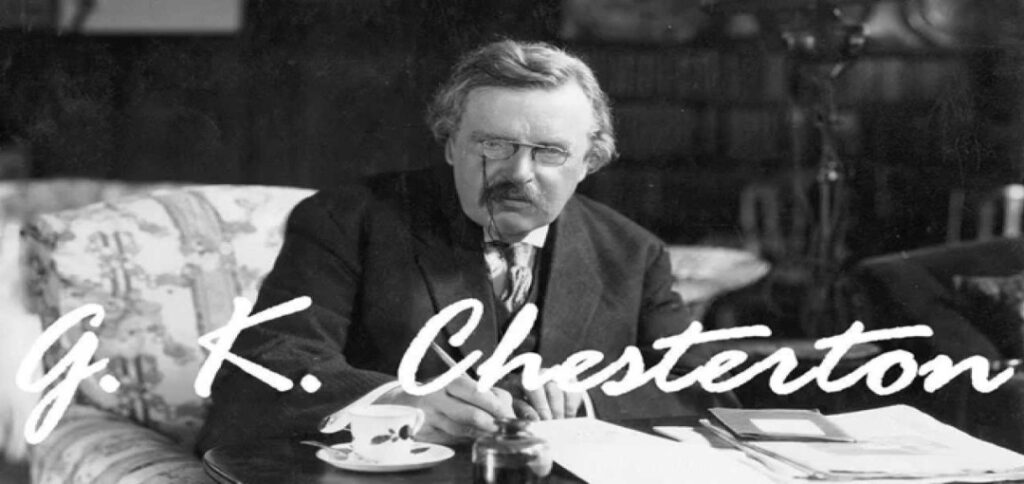G.K.Chesterton and THE FUTURE OF FREEDOM – extracts of a speech given recently in the Cholmondeley Room of the House of Lords
“Why we need to be much more PC – politcally courageous”
Talking about the future of freedom a friend who dedicates his life in the defence of true freedom used these words of G.K.Chesterton, that appear in “What’s Wrong With The World”. Chesterton, with his love of paradox, believed that;

“Most modern freedom is at root fear. It is not so much that we are too bold to endure rules; it is rather that we are too timid to endure responsibilities.”
As those of you gathered here know all too well, for every claimed right there is a responsibility; for every claimed entitlement, there is a duty.
Yet, in our distorted, diminished and flaccid language of rights and entitlements we have abandoned the language of responsibilities and duties and timidly accepted an impoverished view of what freedom means.
In Orthodoxy, published in 1906, Chesterton memorably wrote that “to admire mere choice is to refuse to choose” – and yet choice has become the foundation stone of organisations that claim to champion rights and freedoms.
Choice without reference to the consequences is as impoverished as the concept of rights without responsibilities. Freedom for the pike is death for the minnow; freedom for the hunter is death for the hunted.
When it comes to the struggle for life itself, or in the struggle of conscience and belief against coercive liberalism or angry atheism, we need the intellectual ballast, rapier like arguments, and a counter narrative to this impoverished concept of freedom.
In a television interview, last week, I was challenged about my opposition to the ending of the lives of children in the womb. The interviewer accused me of ignoring “the right to choose”.
I pointed out that my opposition to abortion stems from the belief, supported by science, and law, that life begins at fertilisation and that its protection must, therefore be paramount. I cited the 1948 Universal Declaration of Human Rights, Article 3, which says that “We all have the right to life, and to live in freedom and safety.”
Of what use are the other 29 articles if choice trumps the very right to life itself? And what effect does this denial of the right to life have on how we interpret the UDHR’s other articles?
We allow “choice” to trump all other considerations at our peril. It is a puny word when set alongside the considerations that gave rise to the 1948 Declaration – born in the embers of war ravaged Europe.
Choice was hardly a consideration in the context of the Genocide Convention that sat alongside the Declaration.
In 1943 Rafael Lemkin had coined the term ‘genocide’ heavily influenced by the atrocities suffered by the Armenians thirty years earlier, and at around the same time he learned of losing 49 members of his own family in the Holocaust.
He died exhausted and gaunt in 1959, having dedicated his life with ferocious energy to building international legal structures to prevent genocide from ever happening again.
I cannot help but wonder what Lemkin would make of our obsession with personal autonomy and choice; or what he would make of the resignation of Carla Del Ponte, who quit the UN Commission of Inquiry into human rights abuses in Syria citing a “lack of political will” and criticising the UN Security Council which, in her words, “do not want justice”.
This follows years of inertia from the international community in the face of crimes so unimaginably cruel that Del Ponte herself recently said she had never seen their like, even in Rwanda.
In the face of ethnic and religious groups being wiped from the map the Security Council and the International Criminal Court have been exposed as toothless and the Genocide Convention mere ink and paper.
The desire for justice, lasting peaceful cooperation, combined with the horror of war and the degradation of human life provided the impetus for the creation of the UDHR and the Genocide Convention.
Certain principles were at the heart of the project – although some, like Article 18 of the UDHR – which insisted on the right to believe, not to believe, or to change tour belief, were notably opposed by Saudi Arabia and the Soviet Union – in a prefiguring of the pincer movement that is such a danger to Judaeo Christian beliefs in our own times.
Other principles created a creative tension, (between western and eastern philosophical traditions, about whether there should be mention of the Divine, or not) but the political will was so strong that the actors of the day worked through and got the job done for the good of the many. It was the practice of law and politics at its best; and we can learn a great deal from that.
Recall that those principles are clear, that they rely on a notion of universal truth and on a concept of freedom that insists on the protection of the weak and the powerless.
Those principles are, among others: that humanity has a shared dignity in simply being human; that we are both dependent and autonomous rational subjects; that at the heart of a thriving society and one comprised of flourishing individuals is the liberty to express those rational and spiritual capacities; and all that is good flows from recognising these foundation stones.
Implicit in that endeavour was the centrality of fundamental human rights and the upholding of human dignity: a dignity of difference, as Jonathan Sacks, Lord Sacks, our former Chief Rabbi puts it.
Central, too, was the upholding of just laws and the responsibilities that governments must have towards the vulnerable, the voiceless, the powerless and the weak.
Today, we see those central achievements undermined by an intolerance that in recent weeks led to the leader of a political party resigning because he believed it had become impossible for him to carry out his duties while being true to his faith; and a call last week to a Member of Parliament to leave the House of Commons because of his opposition to abortion.
That the person making the call described herself as “pro-choice”showed a peculiar and rather stunted understanding of the English language, the limitations of choice, and the limitations of free speech.
I would encourage Tim Farron and Jacob Rees Mogg with Raphael Lemkin’s famous exhortation that “if you act in the name of conscience you are stronger than any government.”
Abandon your conscience and of what use are any of to anyone else?
It was Chesterton, again, who understood to what this leads: “Religious liberty might be supposed to mean that everybody is free to discuss religion. In practice, it means that hardly anybody is allowed to mention it.”
What kind of tyrannical society do we create when we suppress conscience and silence religious faith by suppressing it and driving it into the catacombs?
Isiah said “remember the rock from which you were hewn; remember the quarry from which you were dug”. When a country like ours develops collective amnesia, and forgets what and, Who made it what it is, we are all in grave danger.
We are undoubtedly facing an existential crisis in how we understand the way to protect our foundational freedoms today.
We are facing a crisis in our belief in international justice; we are facing a crisis in the protection of the right to free religious expression as befits our nature and we are too often found to be making excuses for our lack of political will to do anything about it.
Take the crisis in international justice: There can be no bigger test than our response to the greatest injustices. Genocide in the Middle East; crimes against humanity documented by the UN in north Korea; the impotence of the Security Council and the ICC. Where here is the political will of our forbearers for international justice?
Consider the crisis in freedom of religion or belief and the lack of political will to take seriously the systemic abuse by regimes such as North Korea, Pakistan, Sudan, or Saudi Arabia; the threat in the UK of poorly framed ‘hate speech laws’; the sacking of women like the two Scottish midwives who refused to take part in abortions; and the coercive pressure for people in public life to have private opinions in line with whichever consensus happens to rule the influencer classes.
Against all of this we need to be far more P.C. – politically courageous.
Now many of you in this room have fought hard for many years to protect these fundamental rights at a time in which many have become complacent. But there are too many others who are complacent about the rights and freedoms they enjoy – but also complacent or ignorant as to what is at their source.
We must insist that there are universal truths, as recognised in the very project of the UDHR.
Such truth is not merely the construct of the majority or the powerful, but the very foundation stone that enables both justice and a diverse, thriving, society. Our utilitarian relativism has proved a short term gain for able or powerful actors but is undermining our foundation stones: true justice rooted in truth.
Let me end, as I began, with Chesterton. He said: “According to most philosophers, God, in making the world, enslaved it. According to Christianity, in making it He set it free.”
In reshaping the debate about what constitutes true freedom, about how rights require responsibilities and how choices inevitably must be weighed against the consequences, none of us harbour any illusions about the difficulties facing us.
These freedoms were hard-won and there is a new generational battle underway. In this great Palace of Westminster, we should recommit ourselves to that cause tonight.
![Chesterton wall street[1]](https://davidalton.net/wp-content/uploads/2017/01/chesterton-wall-street1.jpg?resize=213%2C320)


